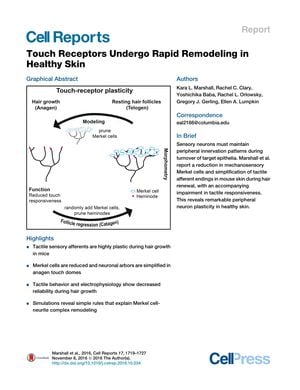Touch Receptors Undergo Rapid Remodeling in Healthy Skin
November 2016
in “
Cell Reports
”
Merkel cells hair follicle regeneration anagen phase axonal arbors tactile responsiveness electrophysiological tests behavioral tests mechanosensitive quantitative immunohistochemistry 3D reconstructions touch receptors hair growth phase nerve endings touch sensitivity electrophysiology behavioral analysis sensitive to touch immunohistochemistry 3D imaging

TLDR Touch sensitivity in mouse skin decreases during hair growth due to changes in touch receptors.
The document from November 1, 2016, presents a study on the plasticity of touch receptors in mouse skin during hair follicle regeneration. It was found that Merkel-cell afferents undergo significant remodeling, with a 90% decrease in Merkel cells and reduced complexity of axonal arbors during the anagen phase of hair growth. This remodeling affects the reliability of tactile responsiveness, as evidenced by electrophysiological and behavioral tests showing less reliable touch encoding and reduced responsiveness to tactile pressure during anagen. Computational modeling suggested that these changes are probabilistic and depend on Merkel-cell inputs. The study concludes that while Merkel-cell afferents are mechanosensitive, their ability to encode gentle touch is compromised during active hair growth, indicating a trade-off between structural plasticity and sensory reliability. The research involved animal models, specifically mice, and used a combination of electrophysiology, quantitative immunohistochemistry, 3D reconstructions, and behavioral testing with two cohorts of 10 mice each.







